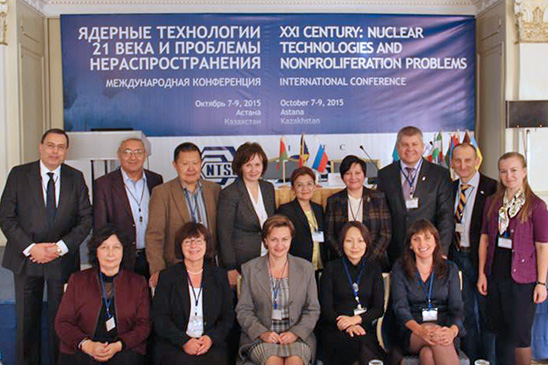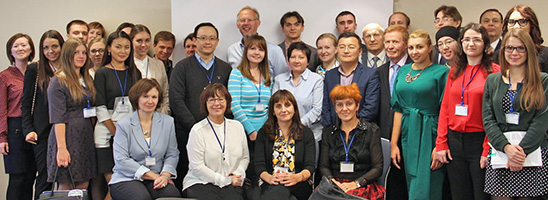Margarita Sevcik
October 22, 2015
Training experts on issues of WMD nonproliferation has a multiplier effect: CNS alumni not only bring back their skills and knowledge to their home countries, but they also—as illustrated recently at an international conference in Astana—contribute to educating yet another generation of nonproliferation experts.
On October 7-9, 2015, over 100 experts from the Caucasus, Central Asia, Belarus, Moldova, and Ukraine, as well as from the European Union and United States, participated in a large international nonproliferation conference titled “XXI Century: Nuclear Technologies and Nonproliferation,” organized by the International Science and Technology Center, the Committee for Atomic and Energy Supervision and Control of the Ministry of Energy of the Republic of Kazakhstan, Nuclear Technology Safety Center, and the Nuclear Society of Kazakhstan. One of the conference objectives was to share experiences and learn about current projects, as well as to identify areas for future regional collaboration and research.

CNS Visiting Fellows Program alumni from Latvia, Kazakhstan, Kyrgyzstan, Russia, and Uzbekistan featured with current and former CNS staff members
A number of conference participants included former CNS visiting fellows from Eurasia, representing universities, research institutions, and government bodies, many of whom delivered presentations at the conference. A number of conference speakers credited CNS with effectively contributing to nonproliferation capacity building in their homes countries and throughout the entire region.

Young Scholars Interdisciplinary Forum speakers and experts
The conference also provided an opportunity for the convening of a Young Scholars Interdisciplinary Forum, “Addressing Emerging Nonproliferation Challenges,” organized by the Swedish Radiation Safety Authority and CNS with the support of the Nuclear Technology Safety Center. The purpose of the forum was to promote interdisciplinary research and allow twenty-five students and PhD candidates an opportunity to present their papers on technical, political, or regional challenges to nuclear nonproliferation. Students were encouraged to make their presentations in English. The forum speakers included technical and social science students from Kazakhstan, Russia, and Ukraine whose professors had undertaken nonproliferation training in Monterey. A number of experts and university professors from Kazakhstan, Russia, Sweden, and United States, provided feedback and comments to students’ papers and recommendations for their future research on various aspects of nonproliferation. The forum concluded with a general round-table discussion of nuclear nonproliferation threats and challenges in science, technologies and politics.
The Astana Conference and Forum serve as a great example of CNS’s multiplier effect and the tangible results CNS training programs have produced in Eurasia by educating and supporting experts in the nonproliferation and export control fields. Since many of these alumni hold university professor positions, they have the responsibility and opportunity to pass on their nonproliferation knowledge and commitment to future generations of scientists and policy makers, who in turn will use their knowledge and skills to address emerging issues and threats of tomorrow.
